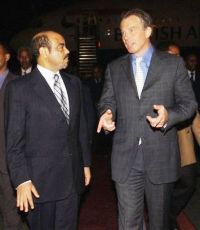Ethiopia PM urges Blair to lobby G8 on Africa
By Madeline Chambers
LONDON, Feb 24 (Reuters) – Ethiopia’s prime minister urged Britain’s Tony Blair on Thursday to try to persuade the world’s richest nations to tackle Africa’s problems.

|
|
Britain’s Prime Minister Tony Blair, right, is greeted by Ethiopian Prime Minister Meles Zenawi, left, in Addis Ababa, Wednesday Oct. 6, 2004 where Blair attended the Commission For Africa meeting. (AP) |
Blair has pledged to use Britain’s current presidency of the G8 group of developed countries to address African poverty and last year set up a “Commission for Africa”, comprising political leaders and campaigners, to make recommendations.
“It is very important that Mr Blair does his homework with his colleagues in the G8,” Meles Zenawi, sitting next to Blair, told reporters after the final meeting of the Commission.
Africa is the only continent to have grown poorer in the past 25 years and campaigners say 6,500 people die of preventable diseases every day.
Blair said the Commission would publish its report on March 11.
“It will be a report that’s brutally frank about the reality, but I hope idealistic about what can be done if the will is there,” said Blair.
As he heads into an election campaign, Blair has tried to position himself as a world leader against African poverty.
Critics call the group the “Blair Commission” and say the money spent on the report would be better used on aid.
They are unconvinced there is the political will to plug Africa’s aid deficit, ease its debt burden and create fair trade rules and say the Commission might be just another talking shop.
“The Commission’s final report must recommend a doubling of aid, cancellation of debt and a timetable for reform of unfair trade rules,” said a spokeswoman for aid agency Oxfam.
“But the real questions are around how it proposes to turn these recommendations into reality.”
Campaigners agree with Zenawi that Blair’s most difficult task will be to get support from other countries, most notably the United States.
Few rich nations meet U.N. targets of boosting aid spending to 0.7 percent of gross national product, which the world body says would halve the number of people who earn less than one dollar a day and have no access to clean water by 2015.
Britain is pressing other countries to back an International Finance Facility which would raise annual aid to poor countries to $100 billion from $50 billion.
But Commissioner Anna Kajumulo Tibaijuka, who works for a U.N. agency in Tanzania, gave Blair the benefit of the doubt.
“My grandmother told me: never turn away from an extended hand before you know it is empty,” she said.
